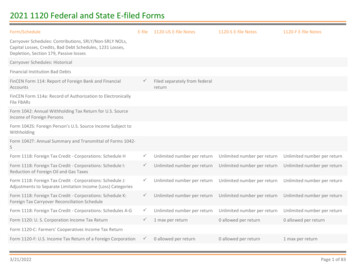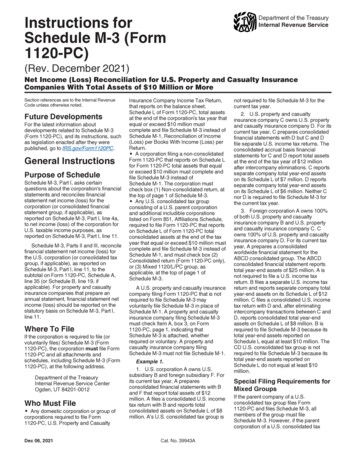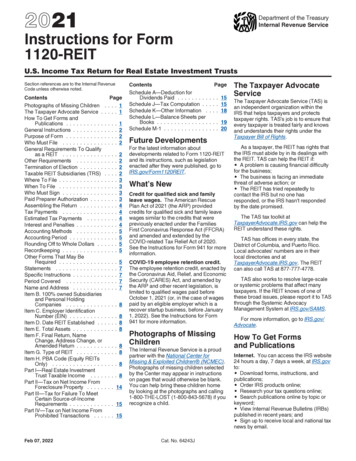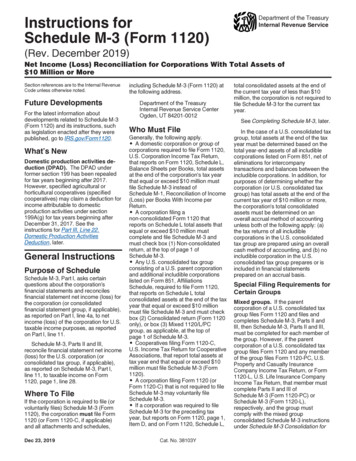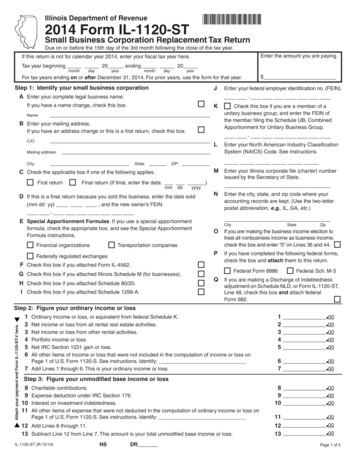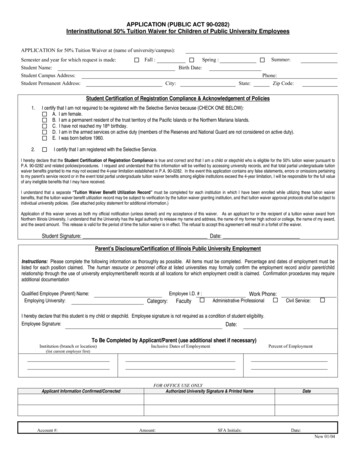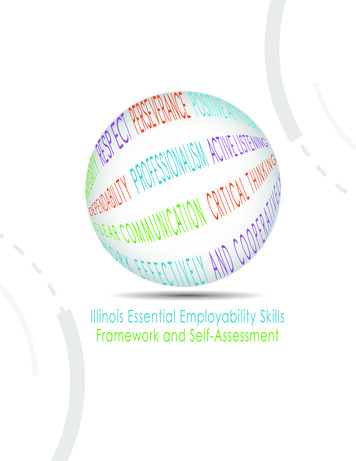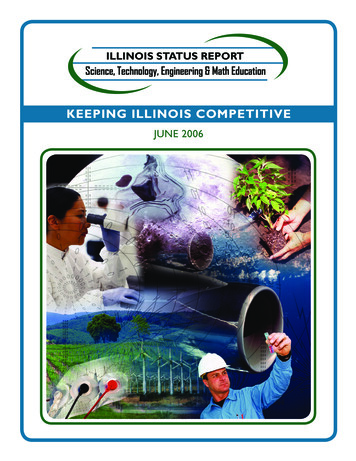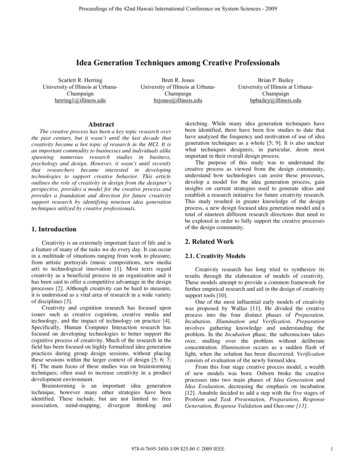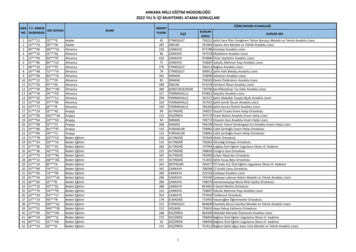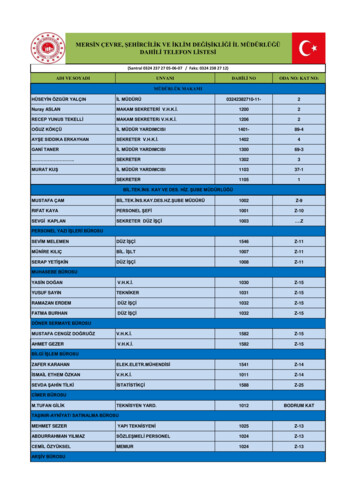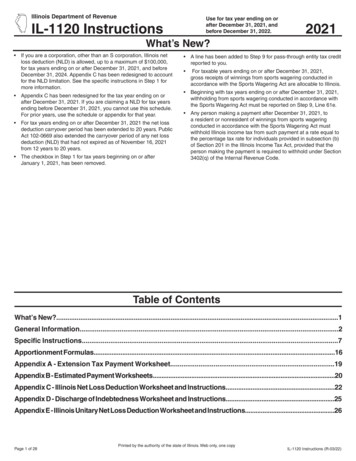
Transcription
Illinois Department of RevenueUse for tax year ending on orafter December 31, 2021, andbefore December 31, 2022.IL-1120 Instructions2021What’s New? If you are a corporation, other than an S corporation, Illinois netloss deduction (NLD) is allowed, up to a maximum of 100,000,for tax years ending on or after December 31, 2021, and beforeDecember 31, 2024. Appendix C has been redesigned to accountfor the NLD limitation. See the specific instructions in Step 1 formore information. Appendix C has been redesigned for the tax year ending on orafter December 31, 2021. If you are claiming a NLD for tax yearsending before December 31, 2021, you cannot use this schedule.For prior years, use the schedule or appendix for that year. For tax years ending on or after December 31, 2021 the net lossdeduction carryover period has been extended to 20 years. PublicAct 102-0669 also extended the carryover period of any net lossdeduction (NLD) that had not expired as of November 16, 2021from 12 years to 20 years. The checkbox in Step 1 for tax years beginning on or afterJanuary 1, 2021, has been removed. A line has been added to Step 9 for pass-through entity tax creditreported to you. For taxable years ending on or after December 31, 2021,gross receipts of winnings from sports wagering conducted inaccordance with the Sports Wagering Act are allocable to Illinois. Beginning with tax years ending on or after December 31, 2021,withholding from sports wagering conducted in accordance withthe Sports Wagering Act must be reported on Step 9, Line 61e. Any person making a payment after December 31, 2021, toa resident or nonresident of winnings from sports wageringconducted in accordance with the Sports Wagering Act mustwithhold Illinois income tax from such payment at a rate equal tothe percentage tax rate for individuals provided in subsection (b)of Section 201 in the Illinois Income Tax Act, provided that theperson making the payment is required to withhold under Section3402(q) of the Internal Revenue Code.Table of ContentsWhat’s New?.1General Information.2Specific Instructions.7Apportionment Formulas.16Appendix A - Extension Tax Payment Worksheet.19Appendix B - Estimated Payment Worksheets.20Appendix C - Illinois Net Loss Deduction Worksheet and Instructions.22Appendix D - Discharge of Indebtedness Worksheet and Instructions.25Appendix E - Illinois Unitary Net Loss Deduction Worksheet and Instructions.26Page 1 of 28Printed by the authority of the state of Illinois. Web only, one copyIL-1120 Instructions (R-03/22)
General InformationWho must file Form IL-1120?You must file Form IL-1120 if you are a corporation that has net income or loss as defined under the Illinois Income TaxAct (IITA); or is qualified to do business in the state of Illinois and is required tofile a federal income tax return (regardless of net income or loss).Unitary filers — If you are a corporation that is a member ofa unitary business group, see Illinois Schedule UB, CombinedApportionment for Unitary Business Group, and its Instructions forinformation about filing requirements.Political organizations and homeowners’ associations — If youare a corporation that falls under the definition in Internal RevenueCode (IRC), Sections 527 and 528, and you report your federaltaxable income on federal Form 1120-POL or federal Form 1120-H,you are subject to Illinois Income and Replacement Taxes and mustfile Form IL-1120.Cooperatives — If you are a corporation operating on a cooperativebasis under IRC Section 1381, and file federal Form 1120-C, youare subject to Illinois Income and Replacement Taxes and must fileForm IL-1120.Settlement funds — If you are a settlement fund under IRCSection 468B and you report your federal taxable income on federalForm 1120-SF, you are subject to Illinois Income and ReplacementTaxes and must file Form IL-1120.Limited liability companies — If you are a limited liability companyand you file as a corporation for federal income tax purposes, youare treated as a corporation for Illinois purposes.Foreign corporations — If you are a foreign corporation, you mustobserve the same filing requirements as U.S. domestic corporations.For Illinois purposes, you should report the taxable income you arereporting for federal purposes under IRC Sections 881 through 885.You must use only the domestic factor information regarding salesinformation in the “everywhere” denominator when apportioningbusiness income to Illinois. If you are a foreign corporation that is amember of a unitary business group, see Illinois Schedule UB andinstructions for information about filing requirements.Charitable organizations, etc. — If you are an organization exemptfrom federal income tax by reason of IRC Section 501(a), you arenot required to file Form IL-1120. However, unrelated businesstaxable income, as determined under IRC Section 512, is subjectto tax (without any deduction for Illinois Income Tax) and mustbe reported on Form IL-990-T, Exempt Organization Income andReplacement Tax Return. For more information, see Form IL-990-TInstructions.Small business corporations — If you are an S corporation, asdefined by IITA, Section 1501(a)(28), you are subject only to IllinoisReplacement Tax and must file Form IL-1120-ST, Small BusinessCorporation Replacement Tax Return. The shareholders of thesecorporations are taxed by Illinois on their distributive shares of thecorporation’s income. For more information, see Form IL-1120-STinstructions.What forms must I use?In general, you must obtain and use forms prescribed by the IllinoisDepartment of Revenue (IDOR). Separate statements not on formsprovided or approved by IDOR will not be accepted and you willbe asked for appropriate documentation. Failure to comply withthis requirement may result in failure to file penalties, a delayin the processing of your return, or a delay in the generationof any overpayment. Additionally, failure to submit appropriatedocumentation when requested may result in a referral to our AuditBureau for compliance action.Corporations must complete Form IL-1120. Do not send acomputer printout with line numbers and dollar amounts attachedto a blank copy of the return. Computer generated printouts are notacceptable, even if they are in the same format as IDOR’s forms.Computer generated forms from an IDOR-approved softwaredeveloper are acceptable.Form IL-1120 (R12/21) is for tax years ending on or afterDecember 31, 2021, and before December 31, 2022. For tax yearsending before December 31, 2021, use the 2020 form. Using thewrong form will delay the processing of your return.How do I register my business?Domestic international sales corporations and foreign salescorporations — If you are a Domestic International SalesCorporation (DISC) under IRC Section 992, you are not subject tothe taxes imposed by IRC Subtitle A (except for the tax imposed ontransfers to avoid income tax under IRC Section 1491). Similarly, youare not required to file Form IL-1120.If you are required to file Form IL-1120, you should register withIDOR. You may registerFor Illinois purposes, distributions from DISCs are treated inaccordance with the federal rules pertaining to dividends, dividendexclusions, and dividend-received deductions. by visiting a regional office.If you are a Foreign Sales Corporation (FSC) for federal purposesand have federal taxable income apportionable or allocable to Illinois,you are subject to Illinois tax rules applicable to all corporations. Youare taxed by Illinois to the extent that your nonexempt foreign tradeincome, investment income, and carrying charges (taxable for federalpurposes) are apportionable or allocable to Illinois.Corporate shareholders who derive income from Illinoisshould include actual and deemed distributions from a DISC or FSCin business income. online with MyTax Illinois, our free online account managementprogram for taxpayers; by completing Form REG-1, Illinois Business RegistrationApplication, and mailing it to the address on the form; orVisit our website at tax.illinois.gov for more information.Registering with the IDOR prior to filing your return ensures thatyour tax returns are accurately processed.Your identification numbers as an Illinois business taxpayer areyour federal employer identification number (FEIN) and your Illinoisaccount number.When should I file?Original filing date — Your Illinois filing due date is the same asyour federal filing due date. See the table on the next page.Real estate mortgage investment conduits (REMIC) — If youare a real estate mortgage investment conduit in accordancewith IRC Section 860A through G, you are not required to fileForm IL-1120.Page 2 of 28IL-1120 Instructions (R-03/22)
Determine the date your tax year ends. If your tax year ends on a date other than June 30, Form IL-1120 is due on or beforethe 15th day of the 4th month following the close of the taxyear.*June 30, Form IL-1120 is due on or before the 15th day of the3rd month following the close of the tax year.**If you are a cooperative, Form IL-1120 is due on the 15th dayof the 9th month following the close of the tax year regardless ofwhen your tax year ends.Automatic extension —Determine the date your tax year ends. If your tax year ends on a date other than June 30, we grant you an automaticextension of time to file your annual return of six months.* June 30, we grant you an automatic extension of time to fileyour annual return of seven months.*See 86 Ill. Adm. Code Section 100.5020 for more information.*If you are a cooperative, we grant you an automatic extension oftime to file your annual return of seven months regardless of whenyour tax year ends.The automatic extension of time to file is granted whether or notyou request it. You are not required to file a form in order to obtainthis automatic extension. If you expect tax to be due, you must payany tentative tax due by the original due date of the return in orderto avoid interest and penalty on tax not paid by that date. Use theExtension Payment Worksheet in Appendix A to determine if you willowe a tentative tax due payment. To pay any tax due by the originaldue date of your return: visit tax.illinois.gov, for information about ACH credit, pay using mytax.illinois.gov, or mail Form IL-1120-V, Payment Voucher for Corporation Incomeand Replacement Tax, using the address on the form.If an unpaid liability is disclosed when you file your return, then youmay owe penalty and interest charges in addition to the tax. See the“What are the penalties and interest?” section below. An extensionof time to file your Form IL-1120 is not an extension of time forpayment of Illinois tax.Additional extensions beyond the automatic extension period —We will grant an additional extension only if an extension is grantedby the Internal Revenue Service (IRS) beyond the date of the Illinoisautomatic extension. Your additional Illinois extension will be equal tothe federal extension, plus one month. You must attach a copy of theapproved federal extension to your Form IL-1120.When should I pay?Payment of tax — You must pay your Illinois Income andReplacement Tax in full on or before the original due date of thereturn. Failure to pay the tax due on or before the original due dateof the return may result in penalty and interest. This payment dateapplies even though an automatic extension for filing your return hasbeen granted.Estimated tax payments — If you reasonably expect your IllinoisIncome and Replacement Tax and surcharge liability to be more than 400 for the tax year, you are required to make quarterly paymentsof estimated tax using Form IL-1120-V, Payment Voucher forCorporation Income and Replacement Tax.Use the Form IL-1120-V for the year that you are making theestimated payment.You should complete the Estimated Payment Worksheet inAppendix B to figure your estimated tax and to determine if you arerequired to make estimated tax payments. Taxpayers with shorttax years must make estimated payments. See 86 Ill. Adm. CodeSection 100.8010(f).Page 3 of 28The due dates for filing your estimated payments are the 15th day ofthe 4th, 6th, 9th, and 12th months of your tax year.We encourage you to make your payments electronically usingMyTax Illinois or Modernized E-File (MeF) systems, or you mayuse Form EFT-1, Authorization Agreement for Certain ElectronicPayments, to set up ACH credit or phone debit. These optionscan be found on our website at tax.illinois.gov. If you make yourpayments using MyTax Illinois, MeF, or EFT, do not mail us yourIL-1120-V forms. You must use one of our electronic paymentoptions if IDOR has notified you that you are required to makepayments electronically.Unitary business groups must make estimated payments on acombined basis using the designated agent’s federal employeridentification number (FEIN) only. For more information aboutdesignated agents or combined estimated payments, refer to 86 Ill.Adm. Code Section 100.5220 and 100.5230, respectively.If you do not pay the required estimated tax payments on time,you may be assessed a late-payment penalty. We will apply eachpayment to the earliest due date until that liability is paid, unless youprovide specific instructions to apply it to another period.You may also be assessed a bad check penalty if your remittanceis not honored by your financial institution.Who should sign the return?Your Form IL-1120 must be signed by the president, vice president,treasurer, or any other officer duly authorized to sign the return.In the case of a bankruptcy, a receiver, trustee, or assignee mustsign any return required to be filed on behalf of the corporation.The signature verifies by written declaration (and under penaltiesof perjury) that the signing individual has personally examined thereturn and the return is true, correct, and complete. The fact thatan individual’s name is signed to a return is prima facie evidencethat the individual is authorized to sign the return on behalf of thecorporation.Any person paid to prepare the return (other than a regularemployee of the taxpayer, such as a clerk, secretary, or bookkeeper)must provide a signature, date the return, enter the preparer taxidentification number (PTIN) issued to them by the Internal RevenueService, and provide their firm’s name, address, and phone number.If your return is not signed, any overpayment of tax isconsidered forfeited if, after notice and demand for signature, you failto provide a signature within three years from the date your returnwas filed.What are the penalties and interest?Penalties — You will owe a late-filing penalty if you do not file a processable return by theextended due date; a late-payment penalty if you do not pay the tax you owe by theoriginal due date of the return; a late-payment penalty for underpayment of estimated tax ifyou were required to make estimated tax payments and failed todo so, or failed to pay the required amount by the payment duedate; a bad check penalty if your remittance is not honored by yourfinancial institution; or a cost of collection fee if you do not pay the amount you owewithin 30 days of the date printed on your bill.Interest — Interest is calculated on tax from the day after the originaldue date of your return through the date you pay the tax.We will bill you for penalties and interest. For more information aboutpenalties and interest, see Publication 103, Penalties and Interest forIllinois Taxes.IL-1120 Instructions (R-03/22)
What if I am discontinuing my business?Liquidation, withdrawal from Illinois, or loss of charter — If youare a corporation that is liquidated, withdraws either voluntarily orinvoluntarily from Illinois, or in any manner surrenders or loses yourcharter during any tax year, you are still required to file tax returns.Also, we will pursue the assessment and collection of taxes owed byyou or your shareholders.Sales or transfers — If you are a corporation that, outside the usualcourse of business, sells or transfers the major part of any one ormore of the stock of goods which you are in the business of selling, furniture or fixtures of your business, the machinery and equipment of your business, or the real property of your business,you or the purchaser must complete and send us Form CBS-1,Notice of Sale, Purchase, or Transfer of Business Assets, no laterthan 10 business days prior to the date the sale takes place. Sendthis form, along with copies of the sales contract and financingagreement, to:ILLINOIS DEPARTMENT OF REVENUEBULK SALES UNITPO BOX 19035SPRINGFIELD IL 62794-9035orREV.BulkSales@illinois.govRequest for prompt determination — You may make arequest for prompt determination of liability, in accordance withIITA 35 ILCS 5/905(i), if you are a corporation in the process ofdissolution. A completed tax return must be on file with us beforeyou can submit a request for prompt determination. Do not submityour return and request at the same time. Mail your initial return tothe address indicated on the form. You should allow 12 weeks forprocessing. If your request is properly made, the expiration of thestatute of limitations (absent fraud) will not extend beyond 18 monthsfrom the date of your request. Mail your request and a copy of yourpreviously submitted return to:ILLINOIS DEPARTMENT OF REVENUEPO BOX 19044SPRINGFIELD IL 62794-9044The procedure described above does not apply to11 U.S. Code Section 505 Determination of Tax Liability requests.What if I need to correct or change my return?Do not file another Form IL-1120 with “amended” figures to changeyour originally filed Form IL-1120. If you need to correct or changeyour return after it has been filed, you must file Form IL-1120-X,Amended Corporation Income and Replacement Tax Return.Returns filed before the extended due date of the return are treatedas your original return for all purposes. For more information, seeForm IL-1120-X instructions.You should file Form IL-1120-X only after you have filed aprocessable Illinois Income Tax return. You must file a separateForm IL-1120-X for each tax year you wish to change.State changes only — File Form IL-1120-X promptly if you discoveran error on your Illinois return that does not relate to an error on yourfederal return but rather was caused by a mistake in transferring information from your federal return toyour Illinois return; failing to report or misreporting to Illinois an item that has no effecton your federal return; or a mistake in another state’s tax return that affects the computationof your Illinois tax liability.If you are claiming an overpayment, Form IL-1120-X must be filedwithin three years after the extended due date or the date thePage 4 of 28return was filed, or within one year after the tax giving rise to theoverpayment was paid, whichever is latest.Federal changes only — File Form IL-1120-X if you have filedan amended federal return or if you have been notified by the IRSthat they have made changes to your return. This includes anychange in your federal income tax liability, any tax credit, or thecomputation of your federal taxable income as reported for federalincome tax purposes, if the change affects any item entering into thecomputation of net income, net loss, or any credit for any year underthe IITA. You must file Form IL-1120-X no later than 120 days afterthe federal changes have been agreed to or finally determined toavoid a late-payment penalty.If your federal change decreases the tax due to Illinois andyou are entitled to a refund or credit carryforward, you must fileForm IL-1120-X within two years plus 120 days of federal finalization.Attach a copy of federal finalization or proof of acceptance from theIRS along with a copy of your amended federal form, if applicable, toyour Form IL-1120-X. Examples of federal finalization include a copyof one or more of the following items: your federal refund check your audit report from the IRS your federal transcript verifying your federal taxable incomeWhat records must I keep?You must maintain books and records to substantiate any informationreported on your Form IL-1120. Your books and records must beavailable for inspection by our authorized agents and employees.Do the IDOR and the IRS exchange income taxinformation?The IDOR and the IRS exchange income tax information for thepurpose of verifying the accuracy of information reported on federaland Illinois tax returns. All amounts you report on Form IL-1120 aresubject to verification and audit.Should I round?You must round the dollar amounts on Form IL-1120 andaccompanying schedules to whole-dollar amounts. To do this, youshould drop any amount less than 50 cents and increase any amountof 50 cents or more to the next higher dollar.What is base income/taxable income?Your base income or loss is your federal taxable income or loss, plusany additions on Lines 2 through 8, less any subtractions on Line 22.See specific instructions for Steps 2 and 3.“Taxable income” as reported for federal income tax purposes isdetermined differently for certain corporations. If you are a life insurance company subject to the tax imposed byIRC Section 801, your taxable income is the life insurancecompany taxable income, plus the amount of distributions frompre-1984 policyholder surplus accounts as calculated underIRC Section 815(a). nonlife mutual or nonlife stock insurance company subject tothe tax imposed by IRC Section 831, your taxable income is theinsurance company taxable income. regulated investment company subject to the tax imposed byIRC Section 852, your taxable income is the investment companytaxable income. real estate investment trust subject to the tax imposedby IRC Section 857, your taxable income is the real estateinvestment trust taxable income. corporation included in the filing of a consolidated incometax return for the tax year, for federal income tax purposes,your taxable income is determined as if you had filed a separateIL-1120 Instructions (R-03/22)
return for federal income tax purposes for the tax year and eachpreceding tax year you were a member of an affiliated group. Yourseparate taxable income must be determined as if the electionprovided by IRC Section 243(b)(2) had been in effect for all years. tax years ending on or after December 31, 2021, and beforeDecember 31, 2024, for which the deduction would exceed 100,000 (NLD limitation). You must count any years in which thededuction you took did not exceed 100,000. cooperative or association, your taxable income is thetaxable income determined in accordance with the provisions ofIRC Sections 1381 through 1388.For tax years ending on or after December 31, 2021, Illinois netlosses cannot be carried back and can only be carried forward for 20tax years. foreign corporation, your taxable income is the amount offederal taxable income described in IRC Sections 881 through885.For tax years ending on or after December 31, 2003, and beforeDecember 31, 2021, Illinois net losses can no longer be carriedback, and can only be carried forward for 12 years. However,the carryover period of any net loss that has not expired as ofNovember 16, 2021, shall be extended from 12 years to 20 years.What if I have an Illinois net loss deduction (NLD)?An Illinois net loss deduction (NLD) can be used to reduce the baseincome allocable to Illinois only if the loss year return has beenfiled and to the extent the loss was not used to offset income fromany other tax year. Corporations, excluding S corporations, thatare members of a unitary group, should use the Illinois Unitary NetLoss Deduction Worksheet in Appendix E, to determine any NLD.S corporations and partnerships, including any that are members ofa unitary group, trusts, and non-unitary corporations should use theIllinois Net Loss Deduction Worksheet in Appendix C to determineany NLD.To determine your “Illinois net loss” start with federal taxable incomeand apply all addition and subtraction modifications and all allocationand apportionment provisions.In order to have any available NLD applied to your return, you mustclaim the deduction on Step 5, Line 38. See specific instructions forStep 5, Line 38.If you have an Illinois net loss for this tax year, you must file FormIL-1120 reporting the loss in order to carry the loss forward toanother year.If corrections have been made to the loss amount (e.g., federal auditor amended return), you must report the corrected amount when youfile.Ensure you have filed returns (i.e., Form IL-1120, FormIL-1120-ST, Form IL-1041, or Form IL-1065) for all periods in whichyou were required to file an Illinois return. Unfiled returns may resultin disallowed losses, processing delays, and further correspondencefrom IDOR.If you need more information about Illinois NLDs see the worksheetsand instructions in Appendices C, D, and E or 86 Ill. Adm. CodeSections 100.2050 and 100.2300 through 100.2330.What if I am a cooperative and have an Illinois NLD?If you are a cooperative, filing form federal 1120-C and you arecarrying an Illinois NLD, you must claim the deduction on Step 5,Line 38. See specific instructions for Step 5, Line 38.If you are a cooperative, filing form federal 1120-C and you makethe election to split your patronage and nonpatronage income andloss amounts, you must complete Schedule INL, Illinois Net LossAdjustments for Cooperatives and REMICs. You are required tocomplete Schedule INL every year and make the loss computationon the appropriate NLD worksheet.What are the limitations of the Illinois NLD?When determining the years to which a loss can be carried forward,corporations, other than S corporations, do not count tax years ending after December 31, 2010, and beforeDecember 31, 2012, (NLD suspension); tax years ending on or after December 31, 2012, and beforeDecember 31, 2014, for which the deduction would exceed 100,000 (NLD limitation). You must count any years in which thededuction you took did not exceed 100,000; andPage 5 of 28For tax years ending on or after December 31, 1999, and beforeDecember 31, 2003, all Illinois net losses must be carried back twoyears (unless an election to only carry forward is made) then forward20 years. The election to carry a loss forward only was made bychecking the appropriate box on the original or amended loss-yearreturn, whichever showed the loss first. Once the election was madeto forgo the Illinois carryback provision, the election was irrevocable.Illinois net losses in tax years ending before December 31, 1999,are allowed as a carryback or carryforward deduction only in themanner allowed under IRC Section 172, including, for example, the10-year carryback allowed to banks for bad debt losses.The following are the carryback and carryforward years generallyallowed for Illinois net losses in tax years ending beforeDecember 31, 1999. Illinois net losses in tax years beginning after August 5, 1997, and ending before December 31, 1999,must be carried back two years, then forward 20 years. on or before August 5, 1997, must be carried back three years,then forward 15 years.For tax years ending on or after December 31, 1996, andbefore December 31, 2003, you may have made the election to forgoany of the previously mentioned Illinois NLD carryback periods bychecking the appropriate box on your loss year return. This electionmust have been made by the extended due date of your return andonce made was irrevocable for that tax year.In addition, the special carryover periods in IRC Section 172, as ineffect for a particular tax year, would apply to losses incurred in thatyear. For example, a “specified liability loss” incurred in 1998 may becarried back 10 years under IRC Section 172(b)(1)(c).Also, no limitations under IRC Section 382 or the separate returnlimitation year provisions of the federal consolidated returnregulations apply to any NLD carryover.What if I have a discharge of indebtedness?If you had discharge of indebtedness income for a taxable yearending on or after December 31, 2008, and all or a portion ofthis income was excluded from your federal gross income due tobankruptcy or insolvency, then you may be required to reduce eitheror both (i) the net operating loss incurred in the taxable year of thedischarge, and (ii) any net operating loss carryovers to the taxableyear of the discharge. If you were required to reduce a federal netoperating loss in the year of the discharge, you may have beenrequired to reduce any Illinois net loss you incurred for the sameyear. This reduction is made on the Illinois income tax return youfiled for the loss year using the Loss Reduction Worksheet on Page10 of these instructions. If you are a corporation (other than an Scorporation) or trust and you were required to reduce or eliminate afederal net operating loss carryover because you had discharge ofindebtedness income, you may be required to reduce or eliminateyour Illinois net operating loss carryovers. This reduction iscalculated on the Discharge of Indebtedness Worksheet in AppendixD of these instructions. Attach a copy of your federal Form 982,IL-1120 Instructions (R-03/22)
R
Real estate mortgage investment conduits (REMIC) — If you are a real estate mortgage investment conduit in accordance with IRC Section 860A through G, you are not required to file Form IL-1120. Charitable organizations, etc. — If you are an organization exempt from federal income tax by reason of IRC Section 501(a), you are
